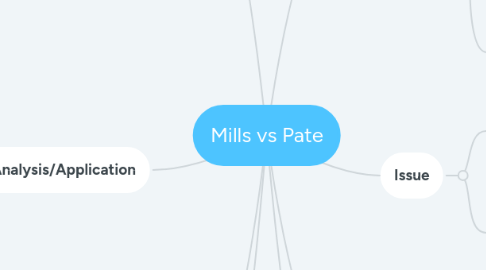
1. Facts
1.1. Parties
1.1.1. Joyceline Mills, appellant
1.1.2. Dr. John Pate, M.D., appellee
1.2. What Happened
1.2.1. On December 2, 1999, Dr. Pate performed his first procedure on Ms. Mills
1.2.2. When six months of the first surgery, Ms. Mills began complaining to Dr. Pate about the results of the procedure
1.2.3. On January 16, 2001, Ms. Mills underwent the second surgery performed by D. Pate
1.2.4. On August 30, 2001, Dr. Pate charged abdominoplasty, which Ms. Mills had not been told to undergo
1.2.5. In September 2001, Ms. Mills went to see Dr. Miller, who referred her to Dr. Gilliand
1.2.6. Dr. Gilliand performed operations, and Ms. Mills was satisfied with the result
1.3. Procedural Hiatory
1.3.1. on January 23, 2003, Ms. Mills filed suit against Dr. Pate for medical malpractice
2. Issue
2.1. informed consent
2.1.1. Ms. Mills alleged that Dr. pate was negligent by failing to properly warn and obtain her informed consent with respect to probable outcome of the procedure and the need for future treatment
2.2. breach of express warranty
2.2.1. Ms. Mills amended her petition to include a breach of express warranty claim
2.2.2. Ms. Mills contends that the trial court erred in granting summary judgement as to her common law claim for breach of express warranty
3. Rule of Law
3.1. former TEX.REV.CIV.STAT. art. section 6.02
3.1.1. for health care liability claims based on the failure of the physician to disclose or adequately to disclose the risks and hazards involved in the medical care or surgical procedure rendered by the physician, recovery may be obtained only the theory of "negligence in failing to disclose the risks or hazards that could have influenced a reasonable person in making a decision to give or withhold consent
3.2. former TEX.REV.CIVA.STAT.art.4590i
3.2.1. a plaintiff may not recover for negligence under theory of informed consent unless had he been informed of the undisclosed risk and that he was injured by the occurrence of the risk of which he was not informed
3.3. a cause of action against a health care provider is a health care liability claim under the Act if it is based on a claimed departure from an an accepted standard of medical care, health care, or safety of the patient, whether the action sounds in contract or tort
4. Analysis/Application
4.1. Plaintiff
4.1.1. informed consent
4.1.1.1. Ms. Mills alleged that Dr. pate was negligent by failing to properly warn and obtain her informed consent with respect to probable outcome of the procedure and the need for future treatment
4.1.2. breach of express warranty
4.1.2.1. Ms. Mills contends that the trial court erred in granting summary judgement as to her common law claim for breach of express warranty
4.2. Defendant
4.2.1. informed consent
4.2.1.1. Dr. Pate asserted that Ms. Mills lacked evidence as to every element of informed consent to the January 2001 procedure, specifically he alleged she had no evidence of duty, breach, causation, or harm relating to the touch-up touch-up liposuction and thigh lift
4.2.2. breach of express warranty
4.2.2.1. Dr. Pate asserted that Ms. Mills' breach of warranty claims was merely an attempt to recast her negligence claims as a breach of contract claim and, in addition, she had no evidence to support the elements of her claim
4.3. Court
4.3.1. informed consent
4.3.1.1. application of former judgement
4.3.2. breach of express warranty
4.3.2.1. application of the Act
5. Conclusion
5.1. informed consent
5.1.1. the trial court correctly found that there was no evidence that Dr. Pate failed to obtain Ms. Mills' informed consent to the second surgery
5.2. breach of express warranty
5.2.1. Ms. Mills' breach of warranty claim is not an improper attempt to recast her informed consent claim to avoid requirement of the Act
6. Impact
6.1. Paragon General Contractors, Inc. v. Larco Const., Inc., 227 S.W.3d 876 (Tex. App. 2007)
6.2. Hunsucker v. Fustok, 238 S.W.3d 421 (Tex. App. 2007)
6.3. Gomez v. PASADENA HEALTH CARE MANAGEMENT, 246 S.W.3d 306 (Tex. App. 2008)
6.4. Methodist Hosp. v. ZURICH AMERICAN INS. CO., 329 S.W.3d 510 (Tex. App. 2009)
6.5. Scott v. Dorel Juvenile Group, Inc., 773 F. Supp. 2d 664 (N.D. Tex. 2011)
7. Importance
7.1. informed consent
7.1.1. Doctors can not be too cautious when they explain risky procedures to patients
7.2. beach of express warranty
7.2.1. The law assumes that doctors give certain warranties concerning medical services that are provided and that they must stand behind these assertions. Doctors should not promise 100% success of any procedure to patients
